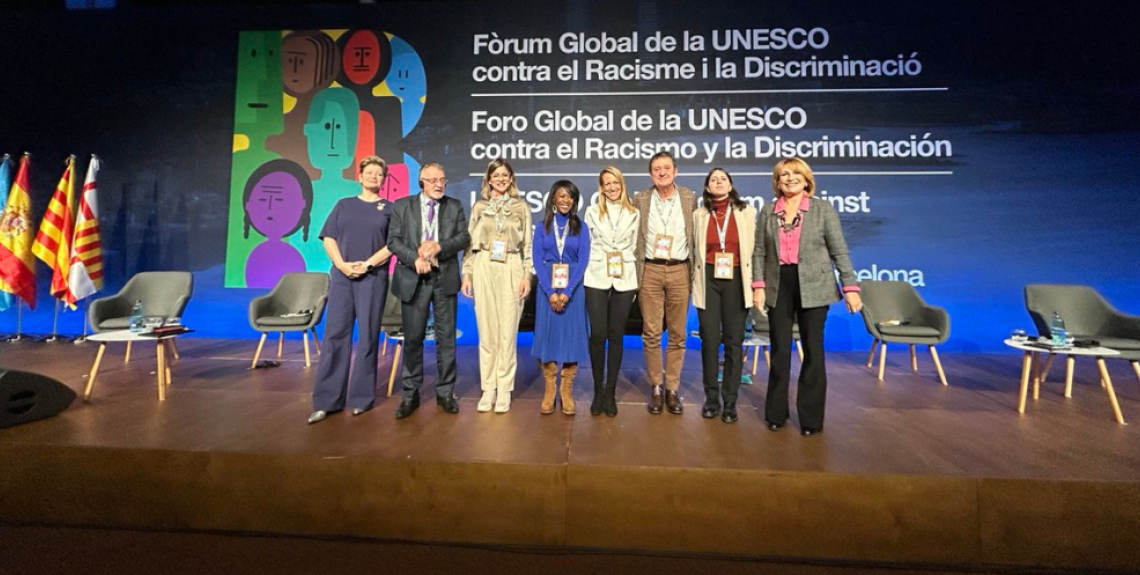On December 9, 2024, after two years working with the City of Barcelona and different local and regional governments around the world to advance the anti-racism agenda globally, our Committee, in collaboration with the City of Barcelona, the Office of the United Nations High Commissioner for Human Rights (OHCHR) and UNESCO, held the side event “Cities and Human Rights: Collaborative Approaches against Racism and Discrimination”, in the run-up to the 4th UNESCO Global Forum against Racism and Discrimination to strengthen the commitment of local and regional governments in this fight.
The session was also attended by Ms Ashwini K.P, UN Special Rapporteur on contemporary forms of racism, racial discrimination, xenophobia and related intolerance, the co-president of the CSIPDHR and Mayor of Grigny, Philippe Rio, and representatives of the cities of The Hague, Montevideo, Gwangju, La Courneuve and Esplugues de Llobregat.
Anti-racism and non-discrimination as key and cross-cutting axes of the Local Social Pact towards the UN World Summit for Social Development in 2025
This session was a fundamental piece in the framework of the Local Social Covenant, a process initiated by UCLG at the U20 (Rio de Janeiro) and aimed at strengthening the contribution of local governments towards the Second UN World Summit for Social Development, to be held in Qatar in November 2025. The Local Social Covenant consolidates as a transformative policy platform designed to advance social justice, equality and sustainable urban development through local action. In this context, anti-racism and anti-discrimination are positioned as key cross-cutting themes, aimed at prioritizing fundamental issues such as housing, climate justice, cultural rights and universal access to quality public services. This approach also highlights the relevance of integrating intersectionality and decolonial perspectives into public policies, promoting profound transformations towards more inclusive and equitable societies.
Emilia Saiz, Secretary General of UCLG reaffirmed the commitment of our municipal movement to lead systemic change through the Local Social Pact during the Plenary Session of the forum “Cities as Catalysts: Municipal Strategies for Inclusive Local Policies”, held on December 10th, International Human Rights Day. The Plenary brought together the cities of Barcelona, Irbid, London, Bologna, The Hague, São Leopoldo and La Courneuve and was moderated by Fabiana Goyeneche, President of the ICCAR Steering Committee.
Collaborative Municipal Approaches against Racism and Discrimination
In both sessions, representatives of local and regional governments shared the approaches they are implementing in their public policies to strengthen their commitment against racism and discrimination:
-
Employing decolonial and intersectional approaches for repairing communities.
In The Hague, there is an independent committee charged with addressing historical injustices that still affect the lives of residents, shared Deputy Mayor Marïelle Vavier. Montevideo also has a special department to repair the Afro-descendant population through access to public services and the right to housing, culture and health. The UN Special Rapporteur on contemporary forms of racism, racial discrimination, xenophobia and related intolerance, Ashwini K.P., encouraged the use of these approaches especially in the face of the rise of the extreme right and extremism.
-
Responsibility of local and regional governments as institutions with a potential role in perpetrating racial discrimination and xenophobia.
Through the Directorate of Citizenship Rights Services, Barcelona guarantees diversity in institutions through visibility and awareness, shared Anabel Rodríguez Basanta, director of that institution. The City of Barcelona shared the long experience of its Office for Non-Discrimination and the adoption of a municipal plan “Barcelona, Anti-Racist City” because “not being racist is not enough” as Mayor Jaume Collboni shared at the opening ceremony of the forum. For its part, The Hague has also assumed from the institutional level the need to strengthen the promotion of diversity through dialogue and awareness. The cities of Barcelona, The Hague and Bologna have begun to question their own role in perpetuating racist or discriminatory patterns in their public actions.
-
Addressing the spatial dimension of discrimination through the territorial dimension.
In La Courneuve, they have created an Atlas of Inequality to understand the disparities on the territory and thus create specific policies that allow to understand the links between racial discrimination and aporophobia, shared Mayor Gilles Poux. The City of La Courneuve has been fighting for several years for the recognition of territorial discrimination as an aggravating factor of racism in its territory, identifying that racialized inhabitants suffer from a double discrimination because they live in popular neighborhoods. From London, they have also paid attention to the relationship between race and poverty, where financial aid has been granted to racial minorities, explained Deputy Mayor Debbie Weekes-Bernard. In Bologna, they are promoting policies to address institutional discrimination and ensure that all persons born in Bologna are considered “Bolognese,” said Emily Clancy, deputy mayor.


